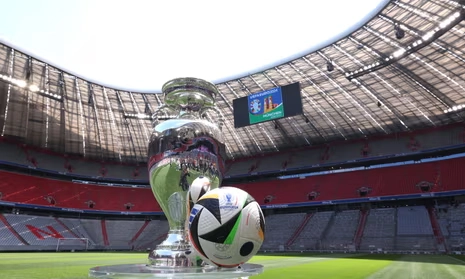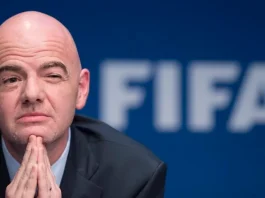The UEFA European Football Championship symbolizes unity, diversity, and a spirit of fair play where teams and fans across Europe come together. However, the recent rise of far-right populism in Germany raises questions about the appropriateness of the country hosting such a prestigious event. Extreme right-wing politics nurture sentiments of prejudice, bigotry, and animosity towards foreigners, which are highly destructive to the spirit of the championship.
In a survey conducted in 2018, it was discovered that 30.4% of eligible German voters identified themselves as holding populist views. Recent polls indicate that the AfD (Alternative for Germany) now enjoys approximately 22% support among German voters, surpassing the ruling government parties.
Further, violence and hate crimes, unfavorable perceptions from the global community, and political volatility threaten the security and viability of the tournament. While Germany struggles with these issues, it becomes critical to determine whether it should continue hosting such an event that seeks to foster unity and diversity on the international level.
Threat to Inclusivity and Diversity
The UEFA European Football Championship reflects multiculturalism and inclusiveness as it gathers teams and spectators from different countries. Exclusivist attitudes are characteristic of the far-right populism that may challenge the celebrating unity. Examples of racism, xenophobia, and anti-immigrant sentiments can make visitors feel uncomfortable.
The majority of companies in the national cross-section (60%) perceive no necessity for addressing issues related to sexual orientation/identity, while 52% hold a similar view regarding matters concerning religion/ideology, implying these topics may be considered taboo.
Hosting an event of this magnitude requires a commitment to inclusivity and recognition, ensuring that all members and fans feel safe and respected. The rising tide of a certain far-right populism in Germany threatens that resolve, potentially discouraging many from attending the event and participating in its festivities.
Potential for Increased Violence and Hate Crimes
The number of hate crimes documented by German police has risen in recent years, climbing from 7,913 incidents in 2017 to 11,520 incidents in 2022. Hate crimes and violent acts have also been attributed to far-right movements. Organizing a major international event such as the UEFA Championship in such a hostile setting puts the lives of players, officials, and spectators at risk. The occurrence of such groups could spark unnecessary confrontations and violence. Therefore, ruining the reputation of the event. In 2020, hate crimes driven by right-wing extremist motives reached significant levels, with over 23,000 reported attacks—an increase of nearly 20% compared to 2019.
Negative International Perception
Organizing the UEFA European Football Championship in a country where far-right populism is on the rise is a hit to the reputation of the event. It can bring negative media exposure and discourage fans from going to the games, affecting ticket sales, tourism, and overall economic returns. The event could be tarnished with political aspects which would overshadow the spirit of the competition.
Furthermore, the championship should become a platform for political statements and demonstrations that distract from the central point of sportsmanship and competition. The global network expects the host state to embody the values of solidarity and respect that the euro stands for, and the modern political climate in Germany threatens to fall short of those expectations.
Impact on Local Communities
The upward pressure of far-right populism can create a hostile environment for local minority communities. In addition, immigrants, shadow people, and religious minorities in Germany may feel particularly vulnerable at some stage of a global event that attracts attention and scrutiny. The influx of international traffic should increase tensions, leading to similar marginalization and discrimination of these companies. Successful terror attacks, even small local ones are turning out to be big ones. There is a lot of increase in voter turnout (around 16 percentage points) in state elections, with the AfD capturing over 30% of this increased turnout.
Local communities need to experience a sense of delight and involvement while their USA hosts a major event like the Euros. However, in an environment charged with far-right ideologies, these communities may rather enjoy worry and exclusion. This goes against the spirit of the UEFA European Football Championship, which aims to unite people from unique backgrounds through the love of football.
Political Instability
Far-right populism often brings political instability, characterized by protests, moves, and clashes with regulatory enforcement. Such instability can have a critical effect on the clean running of such a first-class event as the UEFA European Football Championship. Any disruption may result in logistically challenging situations, delays, and potential harm to participants and spectators.
Germany’s political scene is emerging as increasingly polarized, with some far-right parties gaining a lot of attention. This polarization can cause unpredictable and volatile situations that can be negative for the planning and execution of a global tournament. The focus should be on the games and celebrations of football, not on managing political unrest and instability.
Contradiction with UEFA’s Values
UEFA upholds values such as admiration, equality, and inclusion. Allowing a country experiencing a surge in right-wing populism to host the championship runs counter to these middle-of-the-road ideas. UEFA has a responsibility to ensure that the host nation matches its values and promotes a safe and welcoming environment for all.
Holding the occasion in Germany in the current political climate sends a mixed message about UEFA’s commitment to fighting discrimination and selling human rights. UEFA needs to promote its values through the selection of several nations that embody the concepts of harmony and appreciation and ensure that the tournament remains a celebration of diversity and sportsmanship.
Conclusion
The rise of right-wing populism in Germany is raising serious concerns about its suitability for hosting the UEFA European Football Championship. The potential threats to inclusivity, security, and the general spirit of the tournament are significant. UEFA needs to consider these factors and prioritize a country that is in line with its median values of scale, unity, and appreciation. The fulfillment and positive impact of the championship lies in creating an environment where all participants and fans feel welcome and safe, celebrating this beautiful sport in a spirit of harmony and inclusiveness.




